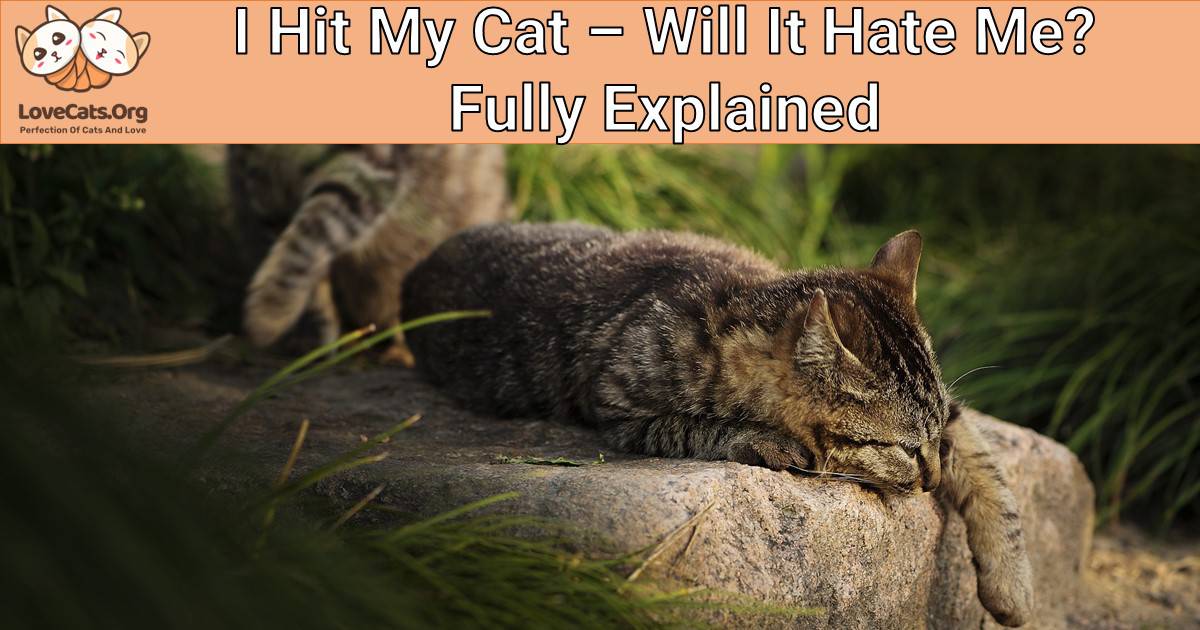In general, if an owner hits their pet in anger without explaining why they did so (e.g., punishment), there’s a good chance that the animal will develop negative feelings towards them
fear at best and hatred at worst!
However, if done with proper guidance from an experienced trainer who explains why this action was taken (i.e., discipline), it may not have long-term effects on the relationship between human and feline companions.
Ultimately though, no matter what approach is used when disciplining pets like cats, patience, and understanding should always come before resorting to physical contact!
What Happens When You Hit Your Cat?
Hitting a cat is never okay.
It can cause physical and emotional harm to the animal and create an environment of fear in your home.
Here are some things that happen when you hit your cat:
Physical Injury
Hitting a cat can lead to severe injury or death due to broken bones, internal bleeding, organ damage, or head trauma.
Emotional Trauma
Cats may become fearful of humans after being struck by them.
They could also develop anxiety disorders like post-traumatic stress disorder (PTSD).
Behavioral Problems
If abused, your pet might start displaying aggressive behavior towards other animals and people.
This includes biting and scratching out of fear rather than aggression.
Additionally, cats who have experienced abuse often display signs like hiding away from their owners for long periods or urinating outside the litter box because they feel unsafe around humans.
Loss Of Trust
Suppose you’ve hurt your feline friend once. In that case, chances are they won’t trust you again, making bonding with them difficult in future interactions.
Legal Consequences
In many countries hitting pets is considered illegal, so there could be legal repercussions depending on where you live.
All these consequences should remind us why we must always treat our furry friends kindly!
Does My Cat Hate Me?
No, your cat does not hate you!
Cats are complex creatures and can show a range of emotions.
Here’s what to look for:
- Purring – cats purr when they’re content. This is usually accompanied by kneading or rubbing against you.
- Tail twitching – if the tail moves in small circles, your kitty is happy with its surroundings (you!).
- Head butting/bunting – pressing their head into yours shows affection from them towards you.
- Slow blinking – slow blinks indicate trust between two individuals. So don’t be surprised if your furry friend gives one back after staring at each other for some time!
If these signs aren’t present, something else may be happening, such as stress or illness, which could explain why they sometimes seem distant.
It’s essential to take note of any changes in behavior and seek advice from a vet if necessary.
They will help determine whether anything needs addressing medically before ruling out emotional issues like dislike or hatred towards someone specific (in this case yourself).
How Do You Apologize To A Cat?
Apologizing to a cat can be tricky.
Here are some tips:
- Acknowledge the mistake – Understand why your cat is upset and take responsibility for it.
- Show remorse – Let them know you regret what happened, even if they don’t fully comprehend it.
- Offer an apology – Use words like “I’m sorry” or “Please forgive me.” You could also offer treats as a gesture of goodwill!
- Give affection – Cats love physical contact, so give them lots of cuddles and petting when apologizing. This will help show how much you care about their feelings too!
- Move on from the incident – Don’t dwell on past mistakes but instead focus on making things better in future interactions with your furry friend by being more mindful next time around.
This way, both parties can move forward without any lingering resentment!
How Can I Get My Cat To Love Me Again?
If you want your cat to love you again, a few things can help.
First and foremost, be patient!
Cats warm up to people they don’t know or haven’t seen.
Here’s what else you should do:
- Spend quality time with them – give them lots of attention by petting and brushing their fur. Whisper so they feel comfortable around you.
- Offer treats as rewards for good behavior – cats respond positively when given something tasty like tuna flakes or kibble.
- Play games together – use toys such as feathers on strings or laser pointers to keep your cat entertained while also helping build trust between you.
- Give plenty of space – let your feline friend have some alone time if needed. This helps create an environment that feels safe enough for them to come back into contact with humans without feeling threatened.
- Show affection through body language – make sure not too much physical contact is made at first but gradually increase until both parties become more familiarized with each other’s presence.
Will My Cat Take Revenge?
The answer depends on several factors, such as your relationship with your pet, personality type, and how it has been treated.
Generally speaking, though, cats don’t seek vengeance against humans unless provoked by physical abuse or neglect over an extended period.
Here’s what you should know about feline retribution:
- Cats may remember if someone mistreats them – If you’ve ever done anything to hurt your kitty (like pulling her tail), you might not forget that experience easily! It could act out later when given another opportunity. This would constitute taking “revenge.”
- Some breeds are more prone than others – Certain cats tend to be more territorial and aggressive. These felines may feel threatened easier, leading them to seek retaliation from those who had wronged them before. These include Siamese cats, Bengal tigers, and Maine Coons, among others.
- It all comes down to trust – Ultimately, whether or not your cat takes revenge boils down mainly to how much trust exists between both parties involved in any situation where harm was caused previously. If there isn’t enough mutual respect, chances increase significantly that some form of payback will eventually occur.
In conclusion, while most cases involving “catty” behavior won’t result in outright acts of vengeance, it pays off greatly for owners everywhere to keep close tabs on their pets’ feelings and emotions just in case!
Final Thoughts: I Hit My Cat – Will It Hate Me?
In conclusion, hitting a cat can have serious consequences.
It may cause the animal to become fearful and distrustful of its owner or even lash out in aggression.
Cats are sensitive creatures who need love and understanding from their owners.
Physical punishment should never be used as discipline for cats.
Suppose you find yourself feeling frustrated with your pet’s behavior.
In that case, other methods, such as positive reinforcement training, will help them learn better behaviors without fear or pain.
Ultimately, if you hit your cat – no matter how unintentional it was – they could very well hate you afterward
due to the trauma inflicted upon them by this act of violence against an innocent creature who only wanted love and affection from their human companion!


